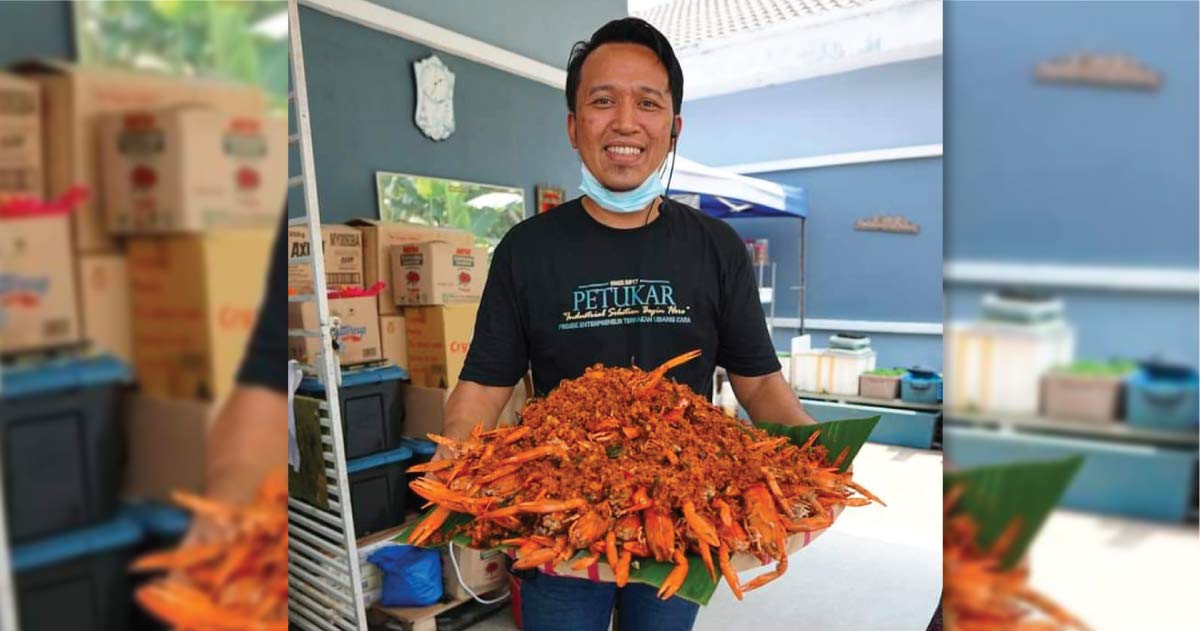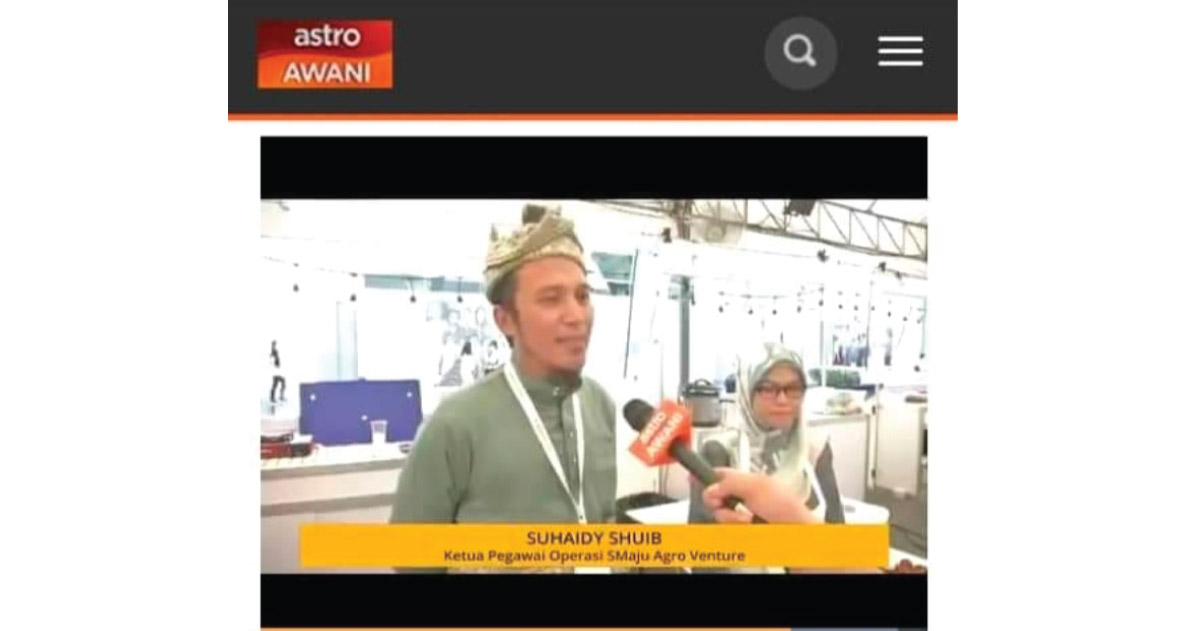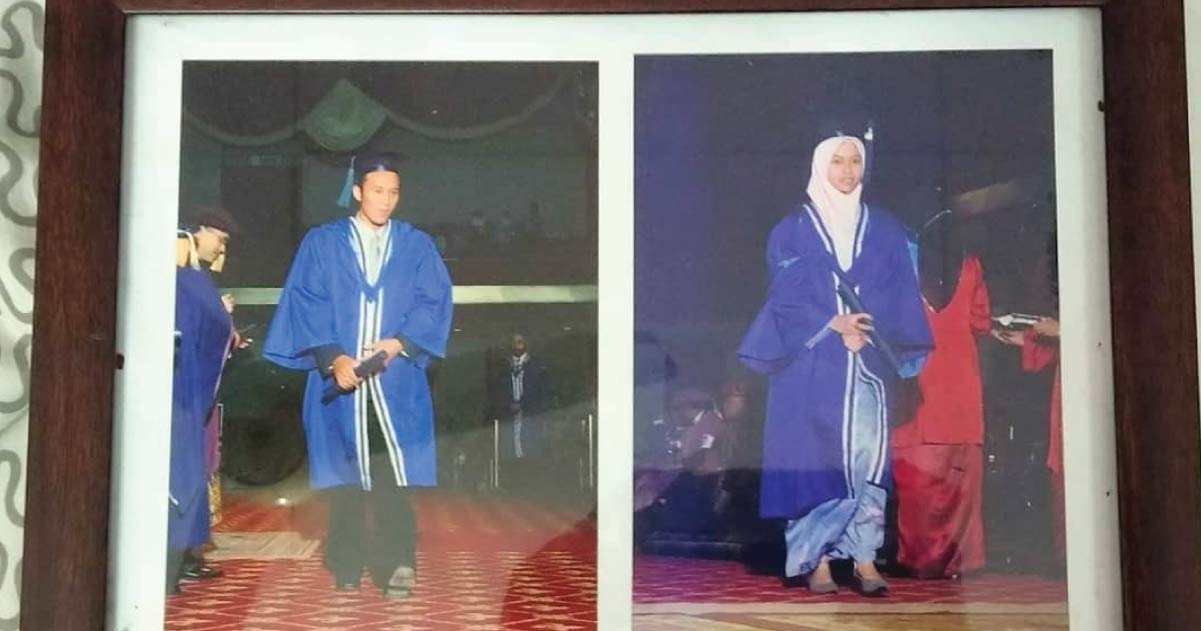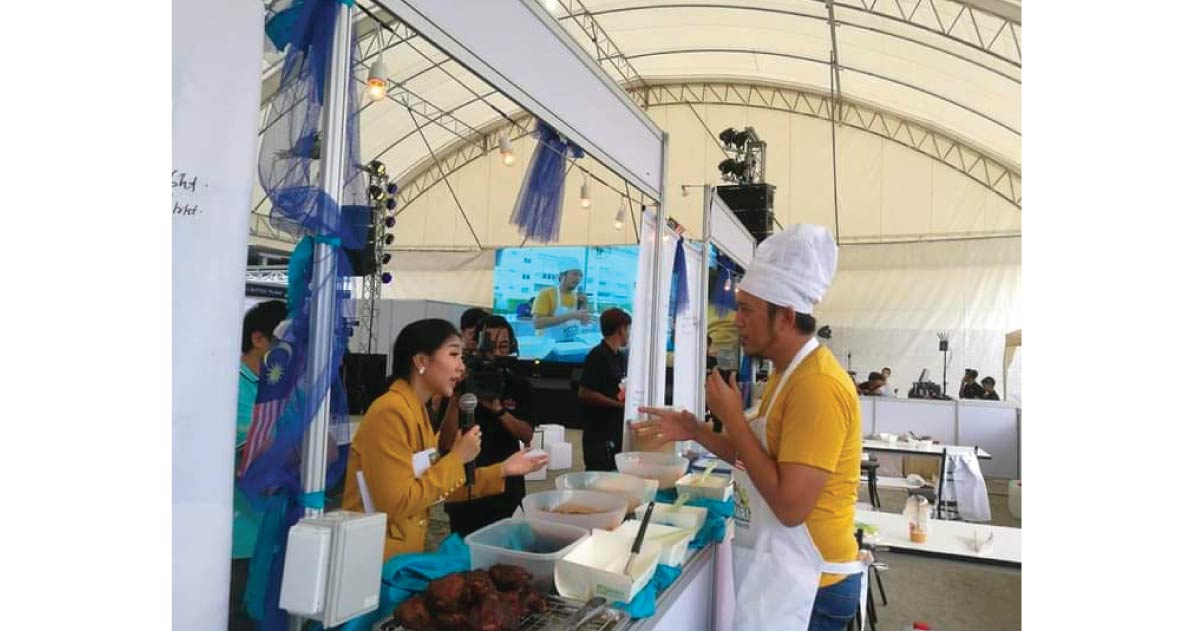

If you prefer lobster to salmon and salmon to steak but for economic reasons have chosen salmon over steak, you might change your mind and still opt for lobster when it is presented to you as the day’s special on the menu. It is characteristic of a trait called transitivity, which rationalizes economic choice. Two graduates from MSU College of Management and Science University (MSU) tell their economic twist to the lobster story.

“Premium lobster species retail as highly as RM360 per kilogramme in restaurants. We are happy to go from hobby to contributing to the national economy,” says Suhaidy Shuib.
Together with wife Aishah Zakaria, Suhaidy is rearing lobsters of the red-claw variety. Fellow graduates of Diploma in Management at MSU College Seremban, they had co-founded SMaju Agro Venture and bred arowanas, minnows, and carps as a pastime to full-time careers in civil service. A chance encounter with another breeder in Melaka resulted in Suhaidy resigning his day job and refocusing on lobsters.

Currently bringing in RM40 billion a year on the global market, lobsters stake a quarter of the market share in the Asia-Pacific region. Asia is where most of the world’s middle class are projected to be by 2030; and by 2025, through more than 220 cities boasting over a million residents each, China will have added 350 million more – six times the population of Europe today. To maintain current levels of per capita consumption, the United Nations Food and Agriculture Organization (FAO) projects that global aquaculture production has to reach 80 million tonnes by 2050. The crustaceans present huge economic potential against Malaysia’s target for the total gross national income contribution of the agriculture sector to increase by 34 billion.
Starting out as a home farm with 18 tanks and 100 lobsters, SMaju Agro Venture now boasts 74 tanks equipped with Re-Circulating Aquaculture System on a sizeable piece of land in the state of Selangor’s Kuala Langat district. It has become the country’s sole collection and breeding hub under the Ministry of Agriculture and Food Industry’s Department of Fisheries Malaysia and Lembaga Pertubuhan Peladang Negeri Selangor, and runs workshops for young agropreneurs through PETUKAR (Projek Entrepreneur Ternakan Udang Kara) Selangor in collaboration with the Hulu Langat Farmers Association. SMaju Agro Venture had been 1st Runner Up for Selangor’s Best Young Agropreneur.
From development to leadership, advancement, and research, everything the duo do has been inspired by the entrepreneurial mindset built at their alma mater. Management and Science University (MSU) was in 2016 proclaimed by the Ministry of Higher Education as the Most Entrepreneurial Private University in Malaysia. MSU went on to emerge Asia's first University internationally recognized by the Netherlands-based ACEEU as Entrepreneurial and Engaged. In 2020, ACEEU presented MSU President Professor Tan Sri Dato’ Wira Dr Mohd Shukri Ab Yajid with the Lifetime Achievement in Entrepreneurship Award 2020.
“We have successfully developed special transport pallets with Universiti Putra Malaysia (UPM), and are now moving on to a test-kit prototype for disease detection. We used to sell cooked lobsters on-site – in buttermilk, garlic butter, and dried chilli options – but COVID and the MCO steered us into takeaway only. When both of these are over, what could be next for the business is a dream to turn the site into an agro-tourism park one day,” closes Suhaidy.

Related
A social purpose in entrepreneurship
MSU Bachelor in Entrepreneurship (Hons)
MSU Diploma in Entrepreneurship
MSU Bachelor in Retail Management (Hons)
MSU Master in Business Administration
Look up more undergraduate business programmes at the Faculty of Business Management and Professional Studies (FBMP) and postgraduate programmes at the Graduate School of Management (GSM).
If you prefer lobster to salmon and salmon to steak but for economic reasons have chosen salmon over steak, you might change your mind and still opt for lobster when it is presented to you as the day’s special on the menu. It is characteristic of a trait called transitivity, which rationalizes economic choice. Two graduates from MSU College of Management and Science University (MSU) tell their economic twist to the lobster story.

“Premium lobster species retail as highly as RM360 per kilogramme in restaurants. We are happy to go from hobby to contributing to the national economy,” says Suhaidy Shuib.
Together with wife Aishah Zakaria, Suhaidy is rearing lobsters of the red-claw variety. Fellow graduates of Diploma in Management at MSU College Seremban, they had co-founded SMaju Agro Venture and bred arowanas, minnows, and carps as a pastime to full-time careers in civil service. A chance encounter with another breeder in Melaka resulted in Suhaidy resigning his day job and refocusing on lobsters.

Currently bringing in RM40 billion a year on the global market, lobsters stake a quarter of the market share in the Asia-Pacific region. Asia is where most of the world’s middle class are projected to be by 2030; and by 2025, through more than 220 cities boasting over a million residents each, China will have added 350 million more – six times the population of Europe today. To maintain current levels of per capita consumption, the United Nations Food and Agriculture Organization (FAO) projects that global aquaculture production has to reach 80 million tonnes by 2050. The crustaceans present huge economic potential against Malaysia’s target for the total gross national income contribution of the agriculture sector to increase by 34 billion.
Starting out as a home farm with 18 tanks and 100 lobsters, SMaju Agro Venture now boasts 74 tanks equipped with Re-Circulating Aquaculture System on a sizeable piece of land in the state of Selangor’s Kuala Langat district. It has become the country’s sole collection and breeding hub under the Ministry of Agriculture and Food Industry’s Department of Fisheries Malaysia and Lembaga Pertubuhan Peladang Negeri Selangor, and runs workshops for young agropreneurs through PETUKAR (Projek Entrepreneur Ternakan Udang Kara) Selangor in collaboration with the Hulu Langat Farmers Association. SMaju Agro Venture had been 1st Runner Up for Selangor’s Best Young Agropreneur.
From development to leadership, advancement, and research, everything the duo do has been inspired by the entrepreneurial mindset built at their alma mater. Management and Science University (MSU) was in 2016 proclaimed by the Ministry of Higher Education as the Most Entrepreneurial Private University in Malaysia. MSU went on to emerge Asia's first University internationally recognized by the Netherlands-based ACEEU as Entrepreneurial and Engaged. In 2020, ACEEU presented MSU President Professor Tan Sri Dato’ Wira Dr Mohd Shukri Ab Yajid with the Lifetime Achievement in Entrepreneurship Award 2020.
“We have successfully developed special transport pallets with Universiti Putra Malaysia (UPM), and are now moving on to a test-kit prototype for disease detection. We used to sell cooked lobsters on-site – in buttermilk, garlic butter, and dried chilli options – but COVID and the MCO steered us into takeaway only. When both of these are over, what could be next for the business is a dream to turn the site into an agro-tourism park one day,” closes Suhaidy.

Related
A social purpose in entrepreneurship
MSU Bachelor in Entrepreneurship (Hons)
MSU Diploma in Entrepreneurship
MSU Bachelor in Retail Management (Hons)
MSU Master in Business Administration
Look up more undergraduate business programmes at the Faculty of Business Management and Professional Studies (FBMP) and postgraduate programmes at the Graduate School of Management (GSM).